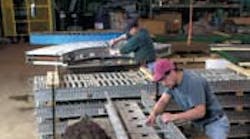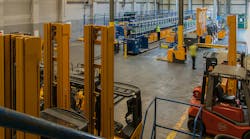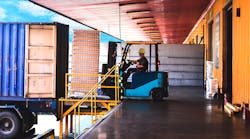By Stafford G. Sterner
Now is a good time to consider used material handling equipment. For those struggling to survive in this down market, selecting used instead of new equipment is an opportunity to save a significant amount of money.
And, there’s plenty of supply. In fact, we may soon see droves of used equipment sellers crawling out of the woodwork. Today, there’s a mad rush to consolidate facilities to cut costs and drive efficiency. A company that once had 10 distribution centers, for example, now has five. There’s nothing wrong with equipment from closed facilities. Businesses are liquidating it not because it is defective but because they need to shed assets.
As a result, material handling professionals can buy a fully functioning piece of equipment for pennies on the dollar. But, don’t smash the piggy bank just yet. Caution is strongly advised when investigating the opportunity offered by used material handling equipment. Consolidation is creating a profit opportunity that unscrupulous people will exploit.
There is no board that certifies dealers of used pallet racks, for example. Used dealers are not authorized by the original manufacturer or anyone else. Sellers of used equipment can be ordinary people, brokers, middlemen or auctioneers.
Material handling systems—conveyors, sorting systems and shelving—represent major purchasing decisions, no matter how you slice it. The wrong decision can be costly, and making the right decision can be difficult because of the numerous options available.
So, how do you tell a legitimate operation from a phony one? To get the answer, you have to perform some due diligence. To help you do that, I’ve compiled seven key questions you should ask to avoid being taken to the cleaners.
1. Does the seller stock what it sells?
Dealers with inventory offer delivery assurance and easy inspection of items in stock. Even if the specific item you are looking for is not in the current inventory, the fact that inventory exists tells you some positive things. Some dealers give the impression of having more stock or a larger operation than they have, if they have one at all. Beware of false impressions.
A few years back, a self-proclaimed “major” dealer had a Web site with a picture representing his company location. The photo featured a large, impressive-looking building. Barely visible in the bottom corner of the photo was the dealer’s actual office: a room in the shopping mall across the street.
Obviously, your best bet is to see the dealer’s facility for yourself, but that’s not always convenient, especially in the early stages of your search when you are researching numerous dealers.
2. Is it an established business?
The material handling equipment business is extremely competitive, and dealers with bad reputations don’t last long.Look for a company with at least 10 years of business history under the same name. There is at least one such dealer in every major city in the U.S.
Long-term survival is not just proof that a dealer has treated customers well. Experienced suppliers can tell jewels from junk. They are knowledgeable about industry trends and standards. In general, their recommendations are good, prices are fair and colleagues and competitors respect them.
3. Is it a real business?
I already mentioned people doing business out of basements and shopping malls, but it gets worse. Some people sell material handling equipment in their spare time. They have a day job, which may or may not have taught them something about material handling. They have neither the experience to guide you to the right items nor the resources to support you after the sale.
Ask for a business phone number, not just an e-mail address or cell phone number. If nobody answers the phone, and you get the same person’s voice mail every time, there may be a problem. If your contact can’t meet with you during normal business hours, there’s definitely a problem.
4. Does the seller own what it sells?
Some brokers are nothing more than deal makers, simply flipping equipment by making a couple of phone calls. What you want are people who have demonstrated faith in the quality and salability of their business by investing their own money in it.
Also, any legitimate dealer will be happy to let you inspect equipment. Don’t accept photos. Large dealers may have multiple storage facilities throughout the country. Use the money you save by purchasing used equipment to get on a plane and go see the equipment. If an item has only recently become available, it may still be on the premises of the former owners. If you are performing an inspection at a place not owned by the dealer, ask for proof of ownership.
And, don’t give a dealer money to buy equipment. Some equipment comes on the market because the current owner went bankrupt, and if the court seizes the assets of the company, you may never see the equipment or your money ever again.
| Buyer’s Box Following are a few established suppliers of used material handling equipment. These companies are not the only reputable organizations doing business in this market. This list is intended only to provide a starting point for due diligence. Conveyor Technologies Inc. www.conveyortechinc.com Material Handling Exchange www.m-h-e.com Rack Express www.rackexpress.com Russell Equipment Co. www.russellequipment.com SJF Material Handling Inc. www.sjf.com Yankee Supply Co. www.yankeesupply.com |
5. Is the company financially sound?
If your purchase is large enough to justify the expense, it may be a good idea to get a D&B (Dun & Bradstreet) report. The cost is $100 or less and can easily pay for itself many times over. This will tell you who they buy from, their payment record, lawsuits filed against them, when they were incorporated, number of employees and names of owners and officers.
If people claim to be owners and operators, but they are not listed as either, this may indicate an attempt to shelter themselves or their assets from lawsuits or bankruptcies. While privately held companies will often divulge less information than public ones, reputable companies have nothing to hide. Use common sense when evaluating companies. There are plenty of good people running good companies. Avoid those who conceal their histories, owners, officers, backgrounds and/or financial information.
6. Can the dealer follow up?
Anyone can sell equipment, but only a few service what they sell. Once you own the equipment, someone has to inspect, repair, replace, buy back, deliver, install and maintain it. If the broker can’t do that, you have to start searching for somebody who can. Ask to see facilities and resources for performing such services.
Be aware that some brokers may tell you they have somebody else to perform those services. Keep in mind that adding a middleman can mean a loss of control over costs and schedules. It also complicates communication. Can they repair or replace items that get damaged or need repair? If so, at what price?
7. What is the dealer’s reputation?
You can always ask for references, but be wary of lists they voluntarily give you. Some references are kept on a permanent retainer, and almost all of them are carefully selected.
Instead, ask about jobs they have performed in your area and if you can talk to customers. If they can’t provide names, it may mean they have no track record in your area or have had issues servicing them, resulting in poor relations.
Another tip is to call their competitors. Ask if they have ever heard of the company. Ask about reputation and experiences dealing with them. While impressions and opinions are just that, this is one instance in which no news is not good news. Feedback like “I’d rather not say” or “No comment” are not good testimonials.





